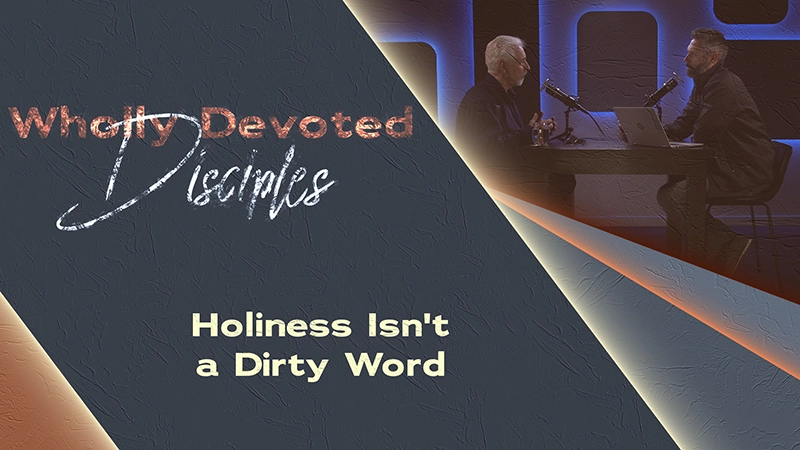
Addiction, Redemption, and the Unforgivable Sin
Here at Pure Life Ministries we deal with men who are seeking freedom from bondage to sexual sin. This means that, for most of our men, while confessing Christ as Savior and Lord, they have been giving over to some besetting sins for years. Many are wondering, when they come to us, if there is any hope for them. They have failed far more than they have succeeded, and have left a trail of repeated lies, devastated spouses, broken relationships, and ruined ministries in their wake. The reasons for their constant failures are addressed elsewhere in this blog. This article is about something else entirely. A great many of the men who come to us, bound in sexual sin, want to know, “Have I committed the unpardonable sin?” They want to know if they are beyond hope. A recent, rather unscientific poll of our residents (a show of hands) revealed that an overwhelming majority of our men have struggled with the issue.
So, have they? Have you? Have you committed the ‘unpardonable sin?’ Are you beyond redemption? Have you committed apostasy? Can you be restored to repentance? Let’s look at the Scripture.
What is the Unforgivable Sin?
The first relevant passage is Mark 3:28-29, and the parallel in Matthew 12:31-32:
“Truly I say to you, all sins shall be forgiven the sons of men, and whatever blasphemies they utter; but whoever blasphemes against the Holy Spirit never has forgiveness, but is guilty of an eternal sin”— because they were saying, “He has an unclean spirit.” Mark 3:28-30
“Therefore I say to you, any sin and blasphemy shall be forgiven people, but blasphemy against the Spirit shall not be forgiven. Whoever speaks a word against the Son of Man, it shall be forgiven him; but whoever speaks against the Holy Spirit, it shall not be forgiven him, either in this age or in the age to come.” Matthew 12:31-32
Let’s take care of the technical matters first. The words “blasphemy” (the noun) and “to blaspheme” (the verb) are transliterated directly into English from the Greek words blasphemia and blasphemeo. The verb means “to speak reproachfully, to slander, to insult, to rail, to revile, to defame.” The issue, however, is more than just the insults that pour forth from one’s mouth. The issue is that “the things that proceed out of the mouth come from the heart” (Matthew 15:18), and the person speaking truly believes the terrible things they are saying.
So let’s look at the context in Mark 3 (and Matthew 12). Jesus was ministering in a house that was crowded with people. Visiting teachers of the law, having come down from Jerusalem, were saying, “He is possessed by Beelzebub! By the prince of demons he is driving out demons.” That was the blasphemous insult. More than words, they actually believed that Jesus was possessed and acting in the power of Satan. In response to their intentional slander, Jesus first showed them that their claim was ridiculous (“How can Satan drive out Satan?”), and then severely warned them about speaking reproachfully against the Holy Spirit. Mark concludes, “He said this because they were saying, “He has an evil spirit.”
In the parallel passage in Matthew 12, it is clear that Jesus had just healed a man who was possessed of a demon. In response, some were saying aloud that He could possibly be the Messiah (the Son of David). But when the Pharisees heard this, they responded with their rebuttal, that, “it is by the prince of demons that He cast out demons!” We hear Jesus say, “Therefore I say to you, any sin and blasphemy shall be forgiven people, but blasphemy against the Spirit shall not be forgiven. Whoever speaks a word against the Son of Man, it shall be forgiven him; but whoever speaks against the Holy Spirit, it shall not be forgiven him, either in this age or in the age to come.” It is as if Jesus were saying, “Say what you will about me, but don’t blaspheme the Holy Spirit!” Blaspheming Jesus can be forgiven. Blaspheming the Holy Spirit will never be forgiven. But remember, the problem is not just the words that come from the mouth, but the evil attitudes of anger, hatred and utter rejection that lie in the heart.
Why is it so dangerous to blaspheme the Holy Spirit? The reason is simple. It is the ministry of the Holy Spirit to witness to the truth. It is the work of the Spirit to convict one of sin, and to convince one of their need for the cleansing blood of Jesus. It is the Holy Spirit who comes to dwell within when one surrenders in faith to the Lord Jesus. Without the work of the Holy Spirit, salvation for the sinner is simply impossible.
One can say and even mean horrible things about Jesus, and yet, in time, still be saved by the ministry of the Holy Spirit. No doubt Saul of Tarsus said many blasphemous things about Jesus before he was confronted by the risen Christ on the Damascus Road. But if one constantly and consistently resists the work of the Holy Spirit, refusing His conviction, rejecting His leading, and resisting His pleading – then there is nothing He can do, in this life or in the next. That is what makes the sin unpardonable. It takes an openness to the Spirit to come to Jesus for pardon. Reject the work of the Spirit, and pardon is not available.
Are you Beyond Redemption?
Now, let’s go back to the situation here at PLM, and in the local church. Men who are bound by habitual sin and have not yet found freedom want to know, “Have I sinned beyond redemption?” Have I committed the unpardonable sin?” Yet the truth of it is that they are at a Christian ministry desperately seeking help from God! It was at the leadership of the Holy Spirit that they arrived here in the first place! He has brought them here because He is nowhere near finished with their lives and intends to discipline them, deliver them, and deploy them to future ministry. Far from repudiating the work of the Spirit, they are desperately seeking His help in their lives. An unpardonable sin has not been committed, or they would never be seeking God for freedom from their sin.
The question is sometimes posed from a different perspective. The student believes that they are beyond redemption because they have “once been enlightened and have fallen away.” (Hebrews 6:4-6) They believe that they are guilty of “sinning willfully after receiving the knowledge of the truth, so now there no longer remains a sacrifice for their sins.” (Hebrews 10:26) They believe they have committed apostasy.
The writer to the Hebrews was addressing the Jewish believers in Christ who had remained in and around Jerusalem, who, under the intense pressure and severe persecution of their surrounding culture, were in danger of forsaking Christ and returning to the religion of Judaism. His letter is interspersed with encouragement to remain faithful and dire warnings about the results of rejecting Christ.
Allow me to paint a picture for you. Let’s go back to Jerusalem, to that last Passover week that is recorded for us in the Gospels. Jesus rode into the city being cheered by the crowds as He proclaimed Himself to be Messiah and king. He was, of course, rejected by the leaders of the Jews, the chief priests and the ruling Sanhedrin, as an imposter and an insurrectionist, a treasonous troublemaker who was a danger to Rome. He was found guilty of blasphemy by the Jews, for claiming to be the Son of God (which He was). He was found innocent by the Romans, yet sentenced to die for being the king of the Jews (which He was also). The Jews and the Romans rejected both of these claims, and so found reason to put Him to death.
Now, in that context, for a Jewish believer to reject Jesus as the Messiah, was, in fact, siding with those who had put Him to death. They were saying that Jesus was a liar, a fraud, a blasphemer, and that He was not the Son of God They were saying that His death sentence was just and that He got exactly what He deserved. They were also saying that He had not been raised from the dead, and that the Good News preached by the apostles was all a lie. That is what it meant to commit apostasy.
So, have you committed apostasy? Have you professed for all to hear, and do you firmly believe that Jesus is a fake and a fraud, that He is not God’s Son, that His bones lie as dust in a grave somewhere? Having once professed Christ, do you now affirm that He was not the Messiah, that He deserved to die on that cross, and that He got what was coming to Him? Having once believed and professed your faith, have you now totally rejected Him and spurned His grace? If you have, then you are lost, pure and simple.
{{blog-si="/blog-ads-storage"}}
But my guess is, if you’re reading this article, that you have not committed apostasy. Neither have you blasphemed the Holy Spirit. My guess is, if you have found this blog, you are desperate to make sure that there is still some measure of hope for you. Let me assure you that there is. The Savior, Whom you worry you have offended beyond relief, may well be offended by your sin, yet He still waits to forgive, heal and restore you completely. You are not beyond help and you are certainly not beyond hope.
What remains for you is to repent and come back to the Lord. Just because you have not yet committed apostasy (repudiated the Faith) or blasphemed the Holy Spirit (completely rejected His influence), that does not mean that you are not in danger of doing so. The longer you stay in your sin, the farther you’ll wander from his Presence. The farther away from Him you go, the more likely the possibility (even probability) that you’ll never return. The time to turn back is now.
Seek the LORD while He may be found;
Call upon Him while He is near.
Let the wicked forsake his way
And the unrighteous man his thoughts;
And let him return to the LORD,
And He will have compassion on him,
And to our God,
For He will abundantly pardon. Isaiah 55:6-7
The men who come to Pure Life Ministries for help worry about their salvation and their standing with God. They worry that they are beyond hope because they have not yet found freedom from their besetting sins. They need a great deal of help. They need discipline, maturity, grace, and humility. They need a safe environment where they can seriously seek the Lord. The need to read the Word, hear the Gospel, and listen to the voice of the Holy Spirit. They need the total dismantling of their self-life. They need repentance, repentance, and more repentance. Some need salvation. All need the Lord Jesus. And they find Him here. They find His mercy and forgiveness. They find in Him new life, a pure life. And they find hope. There is not a sin they’ve committed that He will not abundantly pardon.
















